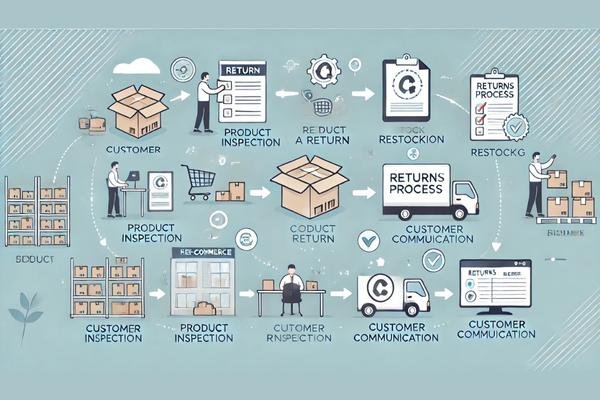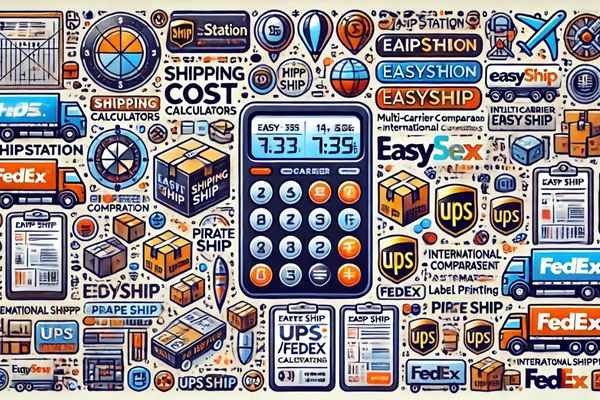
How to Choose the Best Online Store Platform for E-Commerce
October 2, 2024
Top 5 E-commerce Platforms for Multi-Channel Selling
October 2, 2024Top 5 Online Store Platforms for Small Businesses in 2025
As the e-commerce industry continues to evolve, choosing the right online store platform has become critical for the success of small businesses. The right platform not only simplifies setting up a store but also enhances user experience, provides scalability, and integrates with marketing tools to drive sales. In 2025, small business owners have more choices than ever when it comes to e-commerce solutions.
In this article, we will explore the Top 5 Online Store Platforms for Small Businesses in 2025, breaking down each option’s strengths, weaknesses, and ideal use cases.
Table of Contents
1. Shopify: The Best All-Around E-commerce Platform
When it comes to ease of use and a full-featured solution for small businesses, Shopify is a top contender. It is known for its simplicity, allowing even non-technical entrepreneurs to launch an e-commerce store without hassle.
Key Features:
- Ease of Use: Shopify’s drag-and-drop editor makes it easy for anyone to create a professional-looking store. No coding is required.
- App Store: Access to over 7,000 apps, including marketing tools, inventory management, and SEO plugins.
- Mobile-Optimized Themes: All Shopify themes are mobile-responsive, ensuring an optimized shopping experience across all devices.
- Multi-Channel Selling: With Shopify, you can easily sell on social media platforms like Facebook, Instagram, and even marketplaces like Amazon.
Pros:
- Quick setup with little to no technical knowledge required.
- Integrated payment processing.
- A wide range of marketing tools for email, social media, and search engine optimization.
Cons:
- Additional costs for premium themes and plugins.
- Transaction fees if not using Shopify Payments.
Pricing:
Shopify plans start at $29 per month, with higher-tier plans offering more advanced features.
Shopify is an excellent choice for small business owners who want an easy-to-use platform with plenty of growth potential. Its vast ecosystem of apps and extensions makes it a solid option for those seeking to scale.
2. WooCommerce: Best for WordPress Users
WooCommerce is a free, open-source e-commerce plugin for WordPress, making it the best option for small businesses that already use WordPress for their website. With WooCommerce, you have full control over your store’s design and functionality, and it integrates seamlessly with your existing WordPress website.
Key Features:
- Complete Customization: WooCommerce offers full customization options, allowing developers to tweak every aspect of the store.
- SEO-Friendly: Since WooCommerce runs on WordPress, it inherits all of WordPress’s powerful SEO capabilities, making it easier for your store to rank higher in search engines.
- Extensions and Plugins: There are thousands of plugins and extensions for payment gateways, marketing, and inventory management.
- Free Core Plugin: While WooCommerce itself is free, additional features and extensions may incur costs.
Pros:
- Full control over store design and customization.
- Highly scalable for businesses looking to expand.
- Tight integration with WordPress, a platform known for strong SEO performance.
Cons:
- Requires more technical know-how compared to platforms like Shopify.
- You will need to manage your own hosting, security, and updates.
Pricing:
WooCommerce is free to use, but costs for hosting, premium themes, and paid plugins can add up.
For businesses already familiar with WordPress, WooCommerce is the go-to choice. Its flexibility and customization options are unmatched, though it does require more hands-on management.
3. BigCommerce: Best for Scaling Small Businesses
For small businesses that plan to scale quickly, BigCommerce is a robust e-commerce platform that offers enterprise-level tools at a small business-friendly price point. BigCommerce is particularly known for its comprehensive feature set, including advanced SEO tools, multi-channel selling, and an integrated checkout system.
Key Features:
- No Transaction Fees: Unlike Shopify, BigCommerce does not charge any transaction fees, making it more cost-effective for growing businesses.
- SEO Tools: Advanced built-in SEO tools help businesses rank better in search engine results.
- Multi-Channel Integration: Sell across platforms like Amazon, eBay, and Facebook directly from BigCommerce.
- Scalability: BigCommerce is designed to support fast-growing businesses, making it easy to upgrade as your business expands.
Pros:
- No transaction fees.
- Built-in SEO and marketing features.
- Supports multi-channel selling.
Cons:
- Limited customization options compared to WooCommerce or Shopify.
- Slightly steeper learning curve for beginners.
Pricing:
BigCommerce pricing starts at $29.95 per month, with no additional transaction fees.
If you plan to scale your small business into a larger enterprise, BigCommerce offers the advanced features and scalability that can support rapid growth.
4. Wix eCommerce: Best for Simplicity and Design
Wix is known for being one of the easiest website builders on the market, and its eCommerce features are no different. Wix is perfect for small businesses that prioritize beautiful design and a user-friendly setup.
Key Features:
- Drag-and-Drop Builder: No technical skills are needed to build your store, thanks to Wix’s intuitive drag-and-drop editor.
- Pre-Made Templates: Wix offers over 500 eCommerce templates, all of which are mobile-friendly.
- Wix App Market: Gain access to additional features like email marketing, SEO tools, and social media integration through the Wix App Market.
- Integrated Payment Processing: Easily accept payments through PayPal, Stripe, or Wix Payments.
Pros:
- Extremely easy to set up and manage.
- Beautiful, mobile-optimized templates.
- Affordable pricing for small businesses.
Cons:
- Not as flexible or scalable as other platforms like BigCommerce or WooCommerce.
- Limited customization for developers.
Pricing:
Wix eCommerce plans start at $27 per month.
Wix is a great solution for small businesses that prioritize ease of use and design over customization and scalability.
5. Squarespace: Best for Creatives and Service-Based Businesses
Squarespace is well-known for its stunning templates and easy-to-use interface, making it an excellent option for creative professionals and service-based small businesses that want to sell products or services online.
Key Features:
- Beautiful Templates: Squarespace’s award-winning templates are perfect for creatives who want their online store to reflect their brand’s unique aesthetic.
- Built-in SEO Tools: Like other platforms on this list, Squarespace includes SEO tools to help your store rank higher in search engine results.
- Integrated Blogging: Squarespace offers seamless integration with blogging tools, which can help attract more visitors to your store.
- Subscription Selling: Squarespace is ideal for businesses offering subscription services or digital goods.
Pros:
- Gorgeous, professional-looking templates.
- Perfect for creatives or service-based businesses.
- Integrated with powerful blogging tools.
Cons:
- Less flexibility and customization compared to WooCommerce or Shopify.
- Can be expensive for growing businesses.
Pricing:
Squarespace pricing starts at $23 per month for its basic e-commerce plan.
For businesses that prioritize design and ease of use, Squarespace is an excellent choice. Its templates are perfect for showcasing visual products or services.
Top 5 Online Store Platforms for Small Businesses in 2025
Top 5 Online Store Platforms for Small Businesses
| Platform | Key Features | Pros | Cons | Pricing | Link |
|---|---|---|---|---|---|
| Shopify |
– Drag-and-drop editor – Multi-channel selling on social media and marketplaces – Access to 7,000+ apps |
– Easy to use – Mobile-optimized themes – Excellent customer support |
– Additional costs for premium themes/plugins – Transaction fees if not using Shopify Payments | Starts at $29/month | Visit Shopify |
| WooCommerce |
– Full customization – Seamless WordPress integration – Extensive plugin library |
– Open-source and free – Highly scalable – SEO-friendly |
– Requires technical knowledge – Hosting and maintenance are your responsibility | Free (additional costs for hosting and plugins) | Visit WooCommerce |
| BigCommerce |
– No transaction fees – Multi-channel selling – Advanced SEO tools |
– Built for scalability – Supports high-volume sellers – Robust marketing tools |
– Steeper learning curve – Limited customization compared to WooCommerce | Starts at $29.95/month | Visit BigCommerce |
| Wix eCommerce |
– Drag-and-drop builder – Mobile-optimized templates – Integrated payment processing |
– User-friendly – Beautiful designs – Affordable for small businesses |
– Limited scalability – Less flexible for developers | Starts at $27/month | Visit Wix |
| Squarespace |
– Award-winning templates – Built-in blogging tools – Subscription selling support |
– Professional design – Ideal for creatives – SEO-friendly |
– Limited flexibility – Higher costs for growing businesses | Starts at $23/month | Visit Squarespace |
Frequently Asked Questions
1. Which is the best online store platform for a small business?
For most small businesses, Shopify is the best option due to its ease of use, flexibility, and scalability. It offers plenty of integrations and is great for businesses of all sizes.
2. Can I switch e-commerce platforms if my business grows?
Yes, most platforms support data migration. However, it’s important to plan the process carefully as migrating can sometimes lead to downtime or loss of data. Platforms like BigCommerce and Shopify make it easier to scale up without needing to switch entirely.
3. Is WooCommerce free?
Yes, WooCommerce itself is free, but you will need to pay for hosting, domain registration, and any premium themes or plugins you use.
Conclusion
Choosing the right online store platform for your small business is crucial to the success of your e-commerce journey. In 2024, platforms like Shopify, WooCommerce, BigCommerce, Wix, and Squarespace offer a wide range of features that cater to different business needs. Whether you prioritize ease of use, scalability, or beautiful design, there’s a platform that can help you grow your business and reach your target audience.
To get started, assess your business goals, budget, and technical skills before choosing a platform. By doing so, you can select the best option for your business and set yourself up for long-term success in the e-commerce world








